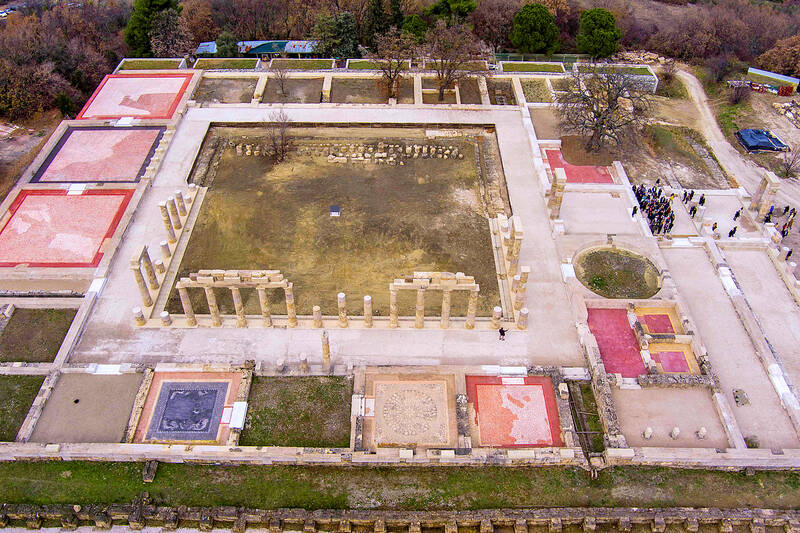It was the largest building of classical Greece: the palace where Alexander the Great was proclaimed king before he launched a conquest that took him as far as modern-day Afghanistan.
The Palace of Aigai in northern Greece was fully reopened on Friday following a 16-year renovation that cost more than 20 million euros (US$21.89 million) and included financial support from the EU.
It was built more than 2,300 years ago during the reign of Alexander’s father, Phillip II of Macedon, who had transformed the kingdom of Macedonia into a dominant military power of ancient Greece. Aigai was its royal capital.

Photo: AFP
“After many years of painstaking work, we can reveal the palace... What we are doing today is an event of global importance,” Greek Prime Minister Kyriakos Mitsotakis said at an on-site inauguration event on Friday.
The palace contained colonnaded courtyards, courts, places of worship and spacious banquet halls, with floors decorated with patterned marble and intricate mosaics. The building covered a ground area of 15,000m2 — a little under the area covered by the US Capitol building.
Shaped like two adjoining, unequally sized square doughnuts, the Palace of Aigai was the administrative and spiritual center of the kingdom. The palace remnants and nearby royal tombs are a UN World Heritage Site at the area next to the modern village of Vergina. Like a three-dimensional jigsaw puzzle, the marble columns were resurrected by fitting pieces of stone unearthed in the ruins together with replica replacement parts.
About 65km southwest of the port city of Thessaloniki in northern Greece, Aigai drew international attention in the late 1970s during burial mound excavations in the area of rolling green hills with patches of wild poppies and daffodils.
The late Greek archeologist Manolis Andronikos led the digs and discovered the royal tombs, recovering a gold casket and other gold artifacts, as well as bones widely believed to belong to Philip II. The discoveries revealed the sophistication of the ancient Macedonians, who had often been sidelined in historical accounts by attention on Athens.
Angeliki Kottaridi was still a university archeology student when she joined the project as a young assistant. She devoted her life’s work to the excavations and decades later became the driving force behind the new museum at Aigai, which opened a year ago, along with the palace restoration.
She retired on Sunday last week as head of the region’s archeological service and was honored at Friday’s ceremony.
“What you discover is stones scattered in the dirt, and pieces of mosaics here and there,” Kottaridi told state television ahead of Friday’s inauguration.
“Then you have to assemble things and that’s the real joy of the researcher,” Kottaridi said. “So when people ask me what makes me happy, I tell them it’s not the moment something is revealed. It’s the moment you realize you can take the knowledge one step further.”
The renovated site is to open to the public today.

Indonesia and Malaysia have become the first countries to block Grok, the artificial intelligence (AI) chatbot developed by Elon Musk’s xAI, after authorities said it was being misused to generate sexually explicit and nonconsensual images. The moves reflect growing global concern over generative AI tools that can produce realistic images, sound and text, while existing safeguards fail to prevent their abuse. The Grok chatbot, which is accessed through Musk’s social media platform X, has been criticized for generating manipulated images, including depictions of women in bikinis or sexually explicit poses, as well as images involving children. Regulators in the two Southeast Asian

COMMUNIST ALIGNMENT: To Lam wants to combine party chief and state presidency roles, with the decision resting on the election of 200 new party delegates next week Communist Party of Vietnam General Secretary To Lam is seeking to combine his party role with the state presidency, officials said, in a move that would align Vietnam’s political structure more closely to China’s, where President Xi Jinping (習近平) heads the party and state. Next week about 1,600 delegates are to gather in Hanoi to commence a week-long communist party congress, held every five years to select new leaders and set policy goals for the single-party state. Lam, 68, bade for both top positions at a party meeting last month, seeking initial party approval ahead of the congress, three people briefed by

The Chinese Embassy in Manila yesterday said it has filed a diplomatic protest against a Philippine Coast Guard spokesman over a social media post that included cartoonish images of Chinese President Xi Jinping (習近平). Philippine Coast Guard spokesman Jay Tarriela and an embassy official had been trading barbs since last week over issues concerning the disputed South China Sea. The crucial waterway, which Beijing claims historic rights to despite an international ruling that its assertion has no legal basis, has been the site of repeated clashes between Chinese and Philippine vessels. Tarriela’s Facebook post on Wednesday included a photo of him giving a

Yemen’s separatist leader has vowed to keep working for an independent state in the country’s south, in his first social media post since he disappeared earlier this month after his group briefly seized swathes of territory. Aidarous al-Zubaidi’s United Arab Emirates (UAE)-backed Southern Transitional Council (STC) forces last month captured two Yemeni provinces in an offensive that was rolled back by Saudi strikes and Riyadh’s allied forces on the ground. Al-Zubaidi then disappeared after he failed to board a flight to Riyadh for talks earlier this month, with Saudi Arabia accusing him of fleeing to Abu Dhabi, while supporters insisted he was